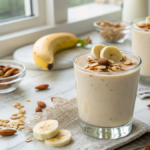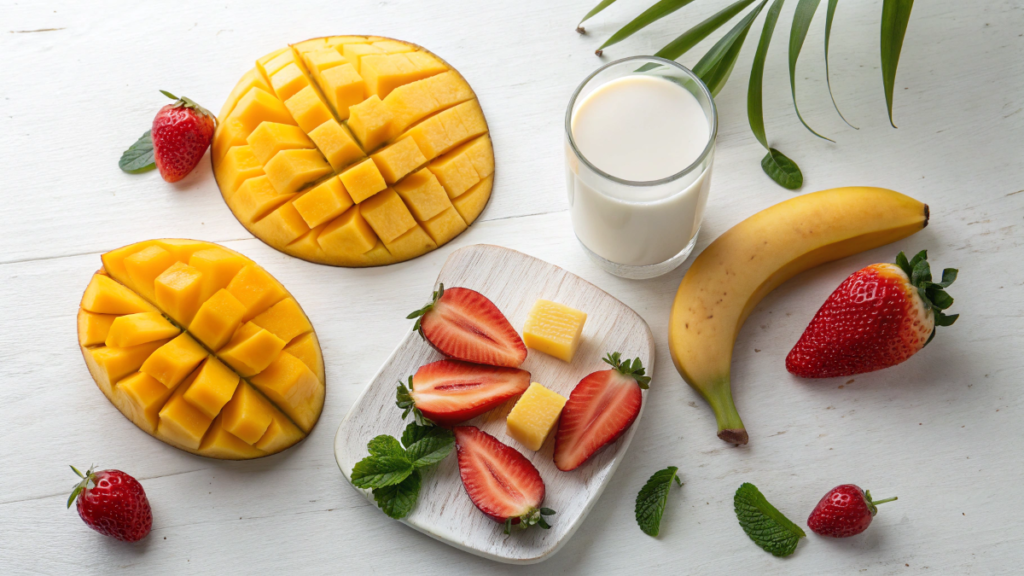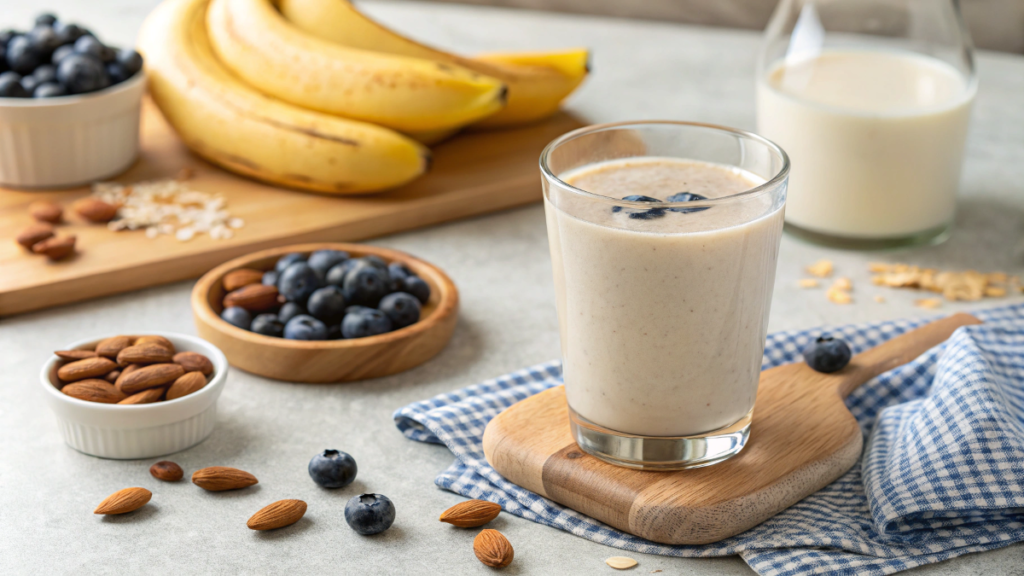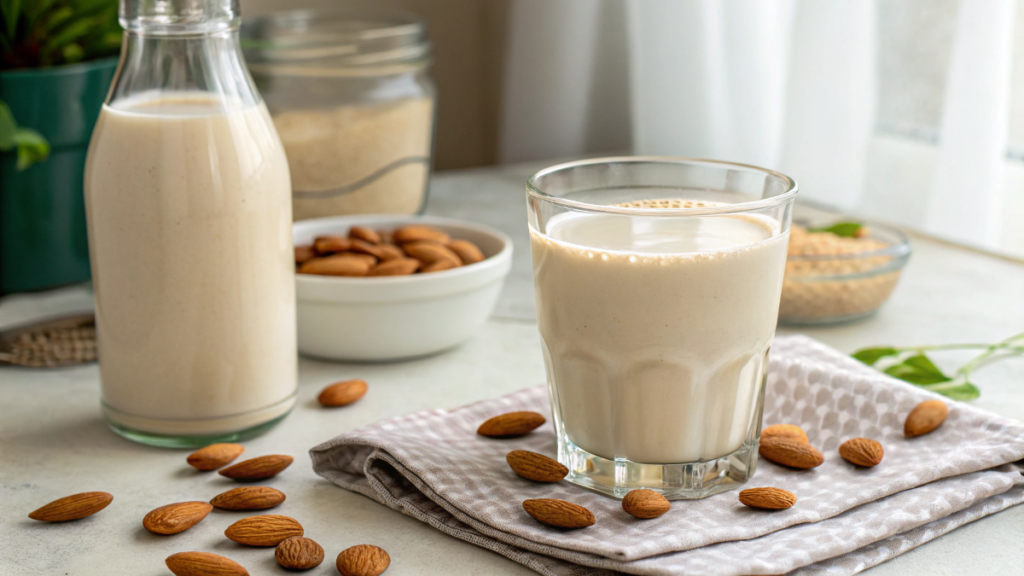Almond milk smoothie recipes are more than just a trend—they’ve become a lifestyle essential for millions. Whether you’re vegan, dairy-free, or just looking for a lighter way to blend, almond milk brings the perfect creamy texture without the weight of traditional dairy. From quick breakfasts and pre-workout fuel to midday snacks and dessert swaps, almond milk smoothies offer a healthy, plant-based solution. In this complete guide, you’ll explore the best almond milk smoothie benefits, top fruit pairings, expert prep tips, common blending mistakes, and answers to popular smoothie questions.
Don’t miss our matcha green tea in smoothies article for another delicious, dairy-free blend idea.
Print
Almond Milk Smoothie
- Total Time: 5 minutes
- Yield: 1 smoothie 1x
- Diet: Vegan
Description
Creamy, dairy-free, and perfect for any time of day—this almond milk smoothie is light, nutritious, and endlessly customizable.
Ingredients
- 1 cup unsweetened almond milk
- 1 frozen banana
- ½ cup mixed berries
- 1 tbsp chia seeds
- ¼ cup rolled oats
- 1 tbsp almond butter
- Handful of spinach
- ¼ tsp ground cinnamon
Instructions
- Add almond milk to blender first.
- Layer in banana, berries, oats, chia seeds, almond butter, and spinach.
- Sprinkle cinnamon on top.
- Blend on high for 30–45 seconds until completely smooth.
- Adjust texture with more almond milk or ice cubes as needed.
- Serve immediately or store in fridge for up to 24 hours.
Notes
Swap in mango or pineapple for a tropical twist. For more protein, add a scoop of plant-based powder. Avoid citrus if you’re worried about curdling.
- Prep Time: 5 minutes
- Cook Time: 0 minutes
- Category: Smoothie
- Method: Blender
- Cuisine: Plant-Based
Nutrition
- Serving Size: 1 smoothie
- Calories: 220
- Sugar: 12g
- Sodium: 150mg
- Fat: 8g
- Saturated Fat: 0.5g
- Unsaturated Fat: 7.5g
- Trans Fat: 0g
- Carbohydrates: 28g
- Fiber: 9g
- Protein: 6g
- Cholesterol: 0mg
Keywords: almond milk, smoothie, dairy-free, breakfast, vegan, clean eating
Benefits of Using Almond Milk in Smoothies
Almond Milk Smoothie as the Ultimate Dairy-Free Base
Almond milk smoothie lovers often choose this base for its versatility, creamy mouthfeel, and low calorie count. Unlike dairy milk, almond milk contains no lactose, less saturated fat, and often no added sugar (especially if you pick the unsweetened kind). That’s why it’s become the go-to for people seeking gut-friendly, vegan, or weight-loss-friendly smoothie options.
Because almond milk is light in flavor, it blends perfectly with fruits, vegetables, protein powders, and nut butters. It doesn’t overpower your ingredients—instead, it enhances them. Vanilla almond milk adds a hint of sweetness that turns a basic fruit smoothie into something crave-worthy.
Another reason the almond milk smoothie continues to grow in popularity is accessibility. You can find almond milk in nearly every grocery store in the U.S., and it’s available in many varieties: vanilla, chocolate, sweetened, unsweetened, and even fortified with calcium and vitamin D.
And yes—it blends like a dream. Whether you’re using frozen berries, leafy greens, seeds, or nut butters, almond milk helps achieve a silky-smooth texture in just seconds.
Health Benefits of Almond Milk in Your Daily Blends
Choosing almond milk as your smoothie base comes with serious nutritional perks. A single cup of unsweetened almond milk contains roughly 30 to 50 calories—compared to the 100+ calories in regular dairy milk. That’s a huge win for anyone watching their weight.
Most store-bought almond milks are fortified with key nutrients like:
- Calcium (for bone strength)
- Vitamin D (for immune function)
- Vitamin E (a powerful antioxidant)
Let’s not forget magnesium and potassium, two minerals critical for hydration and muscle recovery—making an almond milk smoothie a smart post-workout option.
Here’s a quick nutrient snapshot:
| Nutrient | Per 1 Cup Unsweetened Almond Milk |
|---|---|
| Calories | 30–50 |
| Protein | ~1g |
| Total Fat | 2.5g–3g |
| Sugar | 0g |
| Calcium | 30–45% DV |
| Vitamin E | 50% DV |
| Vitamin D | 25% DV |
| Fiber | 1g |
These benefits help reduce inflammation, support heart health, and promote glowing skin—while keeping your smoothie light, creamy, and clean.
Top Fruits That Pair Perfectly with Almond Milk
Almond Milk Smoothie Combinations: Best Fruits That Blend Beautifully
Almond milk smoothie recipes truly shine when paired with the right fruits. While almond milk has a light, neutral flavor, the real magic happens when it meets naturally sweet or tart produce. From tropical to berry blends, the creamy base makes every fruit taste richer and smoother.
Here are the best fruit choices to mix into your next almond milk smoothie:
- Banana: A classic pairing. Bananas add natural sweetness, a creamy texture, and are packed with potassium. Frozen bananas work even better to make your smoothie thick without ice.
- Berries: Strawberries, blueberries, raspberries, and blackberries add antioxidants, vibrant color, and natural sugar. They blend beautifully with vanilla almond milk.
- Mango: Mango chunks offer tropical sweetness and pair well with lime juice and coconut flakes for a sunny island twist.
- Pineapple: Want a refreshing kick? Pineapple’s tartness balances almond milk’s mildness perfectly.
- Peach: A summer favorite, peaches give your almond milk smoothie a sweet, fragrant lift.
- Avocado: Technically a fruit, avocado turns your smoothie into a creamy, high-fiber, healthy-fat treat.
- Apple: Add apple with a dash of cinnamon for a dessert-style blend that feels like pie in a glass.
Seasonal Fruit Guide for Year-Round Almond Milk Smoothies
To keep your smoothies fresh, flavorful, and cost-effective, rotate your fruits by season. Almond milk works with nearly every fruit, so you’ll never get bored.
| Season | Top Fruit Choices for Smoothies |
|---|---|
| Spring | Strawberries, cherries, apricots |
| Summer | Blueberries, peaches, mango, melon |
| Fall | Apples, pears, figs |
| Winter | Citrus fruits, frozen berries |
Frozen fruits are perfect during the off-season. They’re flash-frozen at peak ripeness and maintain both taste and nutrients. Plus, using frozen fruit in your almond milk smoothie helps avoid needing ice.

Check out our natural Mounjaro recipe for another creative way to use fruits in weight-loss blends.
Flavor Pairing Chart: Quick Combo Ideas
| Main Fruit | Secondary Add-in | Optional Enhancer |
|---|---|---|
| Banana | Peanut butter | Cinnamon or cacao powder |
| Strawberry | Mango | Chia seeds or flaxseeds |
| Blueberry | Avocado | Vanilla protein powder |
| Pineapple | Spinach | Lime or mint |
| Apple | Oats | Ground cinnamon or nutmeg |
Each combo turns your basic almond milk smoothie into a flavorful, nutrient-packed experience.
Almond Milk Smoothie vs. Other Milk Alternatives
Almond Milk Smoothie or Coconut, Oat, Soy—Which Is Best?
Almond milk smoothie blends are widely loved, but how do they stack up against other popular milk alternatives? Whether you’re trying to cut calories, boost nutrition, or simply change the taste, it helps to compare your options. Each plant-based milk has unique flavors, textures, and benefits—so let’s break it down.
| Milk Type | Calories (per cup) | Texture | Best Uses in Smoothies |
|---|---|---|---|
| Almond Milk | 30–50 | Light & creamy | Great for any fruit blend, low-calorie base |
| Coconut Milk | 45–75 (carton), 150+ (canned) | Thick & rich | Tropical smoothies, dessert-style blends |
| Oat Milk | 90–120 | Creamy & heavy | Sweet or breakfast blends with oats & nuts |
| Soy Milk | 80–100 | Protein-rich | Post-workout, protein smoothies |
| Cashew Milk | 25–50 | Very creamy | Neutral blends with nutty aftertaste |
Among these, almond milk offers a low-calorie, smooth-textured option with a subtle nutty flavor that works with nearly all fruits and add-ins. It’s the best choice for anyone trying to lose weight or keep blood sugar stable while still enjoying a creamy base.
If you’re making a coconut banana smoothie, coconut milk might be the better pick. But for everyday clean eating, the almond milk smoothie stays ahead of the pack—lighter, easier to digest, and lower in sugar than oat milk or soy.
When to Choose Almond Milk Over Other Options
You’ll want to reach for almond milk when:
- You’re calorie-conscious: Almond milk is one of the lowest-calorie milks available.
- You need a neutral base: It won’t overpower fruits or add strong aftertastes.
- You’re making smoothies frequently: It’s budget-friendly, shelf-stable, and widely available.
- You want a gentle digestive option: Almond milk is naturally lactose-free, gluten-free, and low in allergens.
- You’re vegan or dairy-free: It’s perfect for those avoiding animal products or dairy intolerances.
That said, if you’re after a protein-heavy smoothie, soy or pea milk might be a better fit. But in terms of all-around flexibility, almond milk is a top-tier option.
Almond Milk Smoothie Nutrition: What’s Really Inside?
Almond Milk Smoothie Calories, Protein, and Nutrients Explained
Almond milk smoothie blends are often labeled as “light” or “clean,” but what does that actually mean? If you’re watching your calorie intake, protein levels, or looking to stay energized throughout the day, understanding the nutritional profile of your smoothie is key.
Let’s break down a standard 12–16 oz almond milk smoothie made with:
- 1 cup unsweetened almond milk
- 1 medium banana
- ½ cup berries
- 1 tablespoon chia seeds
- Handful of spinach
| Nutrient | Amount (Approx.) |
|---|---|
| Calories | 180–220 kcal |
| Protein | 5–8g |
| Fiber | 7–10g |
| Total Fat | 6–8g |
| Carbohydrates | 20–28g |
| Natural Sugar | 12–16g |
| Calcium | 35–45% DV |
| Vitamin E | 50% DV |
| Magnesium | 15% DV |
| Potassium | 400–500mg |

That’s a low-calorie, high-fiber smoothie that keeps you full and fueled. The use of unsweetened almond milk helps keep sugar and carbs in check while still contributing a creamy texture. And when you add ingredients like berries, seeds, and greens, you’re building a micronutrient-rich blend with antioxidants, omega-3s, and vitamins A, C, and K.
How to Boost Nutrition in Your Almond Milk Smoothie
If you want to turn your almond milk smoothie into a complete meal or recovery drink, here are easy upgrades:
- Add plant-based protein: Use unflavored or vanilla pea protein powder for 15–20g of protein per serving.
- Fiber up with seeds: Add 1 tbsp of flaxseeds or chia seeds for extra fiber and omega-3s.
- Toss in greens: A handful of spinach or kale boosts iron, folate, and antioxidants without changing flavor.
- Include healthy fats: Almond butter, avocado, or a few walnuts can make your smoothie more filling.
- Use oats: Rolled oats add bulk, slow-digesting carbs, and natural thickness—perfect for breakfast blends.
Want more dense, satisfying meals? Check out our buckwheat bread and pair it with your smoothie for a powerful, plant-based start to your day.
Whether you’re going for weight loss, muscle building, or just a clean daily energy source, the almond milk smoothie is an ideal choice—light on calories, but rich in nutrients and flexibility.
Common Mistakes When Mixing Almond Milk Smoothies
Almond Milk Smoothie Mistakes That Ruin Texture and Taste
Almond milk smoothie recipes are easy to make—but just as easy to mess up if you’re not careful with ingredients, blending order, or ratios. Even a nutritious blend can turn gritty, bland, or unappetizing without the right techniques.
Here are the most common mistakes people make when preparing almond milk smoothies—and how to fix them:
- Using too much almond milk: A thin smoothie feels more like a flavored drink than a satisfying meal. Start with ½ to ¾ cup of almond milk and add more as needed.
- Skipping frozen fruit: Ice waters it down. Instead, use frozen bananas, berries, or mango chunks to get a creamy texture without sacrificing flavor.
- Overloading strong flavors: Almond milk has a mild taste that pairs well with most fruits. Avoid mixing too many pungent add-ins like raw ginger, turmeric, or too much kale—they can overpower the balance.
- Ignoring blend order: Always add liquid first, soft items second, then frozen fruit last. This ensures smoother blending and protects your blades.
- Not blending long enough: Stop too soon and you’ll get clumps. Blend at high speed for at least 30–45 seconds until it’s completely smooth.
What Not to Mix in an Almond Milk Smoothie
The beauty of an almond milk smoothie is its ability to combine with almost anything—but some combos just don’t work well together.
Avoid these bad mix-ins:
| Ingredient | Why It Doesn’t Work |
|---|---|
| Citrus (in large amounts) | May curdle almond milk, creating a weird texture |
| Too much nut butter | Overpowers flavor and adds unwanted heaviness |
| Raw beets | Can taste earthy and don’t blend easily without prep |
| Flavored yogurt | Adds excess sugar and artificial flavors |
| Too many sweeteners | Overpowers natural fruit sweetness; increases calories |
The goal is to strike balance. Keep your ingredients simple, and let almond milk’s smooth base complement—not compete—with your fruit and superfood choices.
Pro Tips to Fix a Bad Smoothie Fast
Already made a flavor fail? Here’s how to save your smoothie:
- Too thin? Add ½ banana or a few ice cubes and re-blend.
- Too thick? Splash in more almond milk slowly while blending.
- Too bitter? Toss in 1 date or a dash of maple syrup.
- Too bland? Add cinnamon, nutmeg, or vanilla extract.
Don’t miss our guide on natural mounjaro weight loss drinks to understand more about ingredient synergy and smoothie formulation.
Almond Milk Smoothie Recipes for Every Occasion
Almond Milk Smoothie Ideas for Breakfast, Dessert, or Post-Workout Energy
Almond milk smoothie recipes aren’t just healthy—they’re also versatile. Whether you need a protein-packed start to your day, a naturally sweet dessert, or a clean post-gym fuel, almond milk blends can do it all.
Here are three quick and delicious almond milk smoothie recipes tailored to different needs:
1. Morning Energy Smoothie (Banana-Oat Power Blend)
This fiber-rich smoothie will keep you full and energized for hours.
Ingredients:
- 1 banana (frozen)
- ¾ cup unsweetened almond milk
- ¼ cup rolled oats
- 1 tbsp almond butter
- 1 tbsp chia seeds
- ¼ tsp cinnamon
Why it works: The oats and almond butter provide complex carbs and healthy fats. Banana adds natural sweetness and potassium.
2. Dessert-Inspired Almond Milk Smoothie (Cocoa-Strawberry Treat)
Sweet enough to feel indulgent—but 100% dairy-free and clean.
Ingredients:
- 1 cup almond milk
- ½ cup frozen strawberries
- 1 tbsp unsweetened cocoa powder
- 1–2 dates (for sweetness)
- Dash of vanilla extract
- Ice cubes (optional)
Why it works: Cocoa and strawberries make a rich, chocolate-dipped flavor combo. Dates keep it refined-sugar-free.
3. Post-Workout Protein Smoothie (Blueberry Hemp Fuel)
Muscle-friendly and packed with plant protein.
Ingredients:
- 1 cup almond milk
- ½ cup blueberries (frozen)
- 1 scoop unflavored protein powder or hemp protein
- 1 tbsp flaxseeds
- ¼ avocado
- 1 tsp honey (optional)
Why it works: Balanced macros (protein, fat, carbs) help recovery while keeping your smoothie silky and satisfying.
Looking for a creamy twist? Discover our coconut milk smoothie guide for flavor variations and tropical smoothie inspiration using a similar approach.
Flavor Hacks to Customize Any Almond Milk Smoothie
Tired of the same recipe every day? Mix it up with these smart add-ins:
| Flavor Goal | What to Add |
|---|---|
| Chocolatey | Cocoa powder, cacao nibs, dark chocolate |
| Tropical | Pineapple, mango, lime zest |
| Creamier | Frozen banana, avocado, Greek yogurt* |
| Spiced | Cinnamon, nutmeg, ginger |
| Green & Clean | Spinach, cucumber, mint |
*Use dairy-free yogurt if staying 100% vegan.
You can even make smoothie bowls by reducing liquid and adding granola, coconut flakes, or fresh fruit on top.
PART 7: Almond Milk Smoothie for Weight Loss and Fitness Goals
Almond Milk Smoothie Recipes That Support Weight Control
Almond milk smoothie blends are one of the best choices for anyone trying to lose weight or maintain a lean physique. Why? Because almond milk is naturally low in calories, contains zero cholesterol, and provides a neutral base that doesn’t interfere with fat-burning ingredients like leafy greens, chia seeds, or berries.
When you use unsweetened almond milk, your smoothie stays under 50 calories before adding any fruits or protein. That leaves room for nutrient-dense, fat-burning ingredients without breaking your calorie budget. Here’s a basic fat-burning recipe:
Fat-Burning Green Smoothie
Ingredients:
- 1 cup unsweetened almond milk
- ½ frozen banana
- 1 handful spinach
- 1 tbsp chia seeds
- ½ green apple
- 1 tsp fresh ginger (grated)
- Ice cubes (optional)
Why it works: This almond milk smoothie is hydrating, fiber-rich, low in sugar, and packed with antioxidants and thermogenic compounds like ginger.
Best Time to Drink Almond Milk Smoothies for Fitness
To make your almond milk smoothie work harder for your fitness goals, timing matters:
| Goal | Best Time to Drink |
|---|---|
| Weight Loss | As a meal replacement for breakfast or lunch |
| Muscle Recovery | Within 30 minutes post-workout |
| Energy Boost (pre-workout) | 60–90 minutes before your workout |
| Appetite Control | Mid-morning or afternoon to prevent snacking |
Pair your smoothie with high-fiber and high-protein ingredients to keep you full for longer and avoid blood sugar spikes.
Top Add-Ins to Make Your Smoothie More Filling
When trying to lose weight, the key is feeling satisfied—not deprived. Add these to your almond milk smoothie to curb hunger and improve metabolic health:
- Avocado: Adds healthy fats and creaminess
- Chia or flaxseeds: Boosts fiber and omega-3s
- Oats: Provides long-lasting energy
- Protein powder: Helps with muscle repair and satiety
- Cinnamon: Balances blood sugar
Almond Milk Smoothie Without Sugar? Here’s How to Make It Delicious
Almond Milk Smoothie Flavor Hacks That Don’t Require Refined Sugar
Almond milk smoothie recipes don’t need sugar to taste incredible. In fact, too much sweetener can spike blood sugar and defeat the purpose of a clean, healthy blend. Luckily, almond milk has a naturally light and slightly nutty flavor that pairs perfectly with a variety of naturally sweet fruits and smart flavor enhancers.
Let’s look at how you can make your smoothie sweet, satisfying, and 100% sugar-free (while still being delicious).

Best Natural Sweeteners for Almond Milk Smoothies
If your fruits alone aren’t cutting it, try these low-glycemic, whole-food options to enhance sweetness:
| Sweetener | Benefits |
|---|---|
| Medjool dates | Rich in fiber and potassium, naturally sweet |
| Banana | Creamy texture, great for freezing |
| Maple syrup | Unprocessed and adds earthy sweetness |
| Cinnamon | Natural blood sugar regulator |
| Monk fruit | Zero calories, perfect for keto smoothies |
| Stevia | Plant-based and extremely sweet in small amounts |
For best results, start small and adjust to taste. A single date or ¼ banana may be all you need to sweeten a basic almond milk smoothie.
Looking for an extra layer of flavor? Don’t miss our sweet honey dessert recipes and turn their core ingredients into smoothie add-ins.
Boost Flavor Without Sugar Using Herbs, Spices, and Extracts
Sweetness isn’t the only way to enhance your smoothie. Try layering your flavors using extracts and spices to add depth without calories.
| Flavor Add-In | Pairs Well With |
|---|---|
| Vanilla extract | Banana, berries, cocoa |
| Almond extract | Cherries, chocolate |
| Ground cinnamon | Apples, pumpkin, banana |
| Fresh mint | Cucumber, pineapple, green smoothies |
| Ginger (grated) | Citrus, carrots, mango |
| Nutmeg or cardamom | Peach, pear, vanilla |
These tiny tweaks make your almond milk smoothie taste gourmet—without a drop of added sugar.
Avoid These High-Sugar Add-Ins
Even healthy-sounding ingredients can be loaded with hidden sugars. Watch out for:
- Flavored yogurts
- Sweetened nut butters
- Pre-made juice or smoothie blends
- Flavored protein powders
- Granola toppings with added syrups
If you’re serious about keeping your smoothie clean and sugar-conscious, always check labels or stick to whole, unsweetened ingredients.
Almond Milk Smoothie Prep & Storage Tips for Busy Lives
Almond Milk Smoothie Hacks to Save Time and Stay Healthy
Almond milk smoothie lovers often struggle with consistency—not flavor, but making one every single day. Between work, school runs, or gym sessions, finding time to wash, chop, and blend can be tough. But with a few clever hacks, you can enjoy a fresh, healthy smoothie in under 60 seconds—even on your busiest mornings.
How to Meal Prep Almond Milk Smoothies for the Week
The best way to streamline your smoothie routine is by prepping ingredients in advance. Here’s a simple method:
Step-by-Step Meal Prep Method
- Pick your favorite smoothie recipes: Rotate through 2–3 blends to avoid flavor fatigue.
- Prep ingredients: Chop fruits, portion out greens, and pre-measure seeds, powders, or oats.
- Bag it: Combine all solid ingredients into freezer-safe bags or jars.
- Label it: Mark each bag with flavor notes (e.g., “choco banana”, “berry green”).
- Freeze: Store all prepped bags flat in the freezer.
- Blend fresh: Each day, dump a bag into the blender, add almond milk, blend, and go!
This turns your almond milk smoothie into a grab-and-go meal, saving precious time without sacrificing quality.
Freezing and Thawing Tips for Maximum Freshness
- Freeze in layers: Place greens first, then fruit, then seeds/powders to prevent clumping.
- Don’t freeze almond milk: Add it fresh when blending to maintain the texture.
- Use glass jars for overnight thawing: Transfer your smoothie pack into a mason jar in the fridge overnight for easy morning blending.
Freezing doesn’t degrade nutrients significantly—so it’s safe, effective, and ideal for batch prep.
Check out our expert tip in the mounjaro tea recipe for more clever healthy meal prep strategies.
Essential Tools for Smoothie Success
You don’t need a fancy kitchen to make a perfect almond milk smoothie, but these tools help:
| Tool | Why It Helps |
|---|---|
| High-speed blender | Ensures smooth consistency with frozen items |
| Freezer-safe containers | Keeps ingredients fresh and portioned |
| Mason jars | Easy storage and on-the-go sipping |
| Silicone freezer trays | Great for freezing almond milk cubes (optional) |
| Digital kitchen scale | Helps with macro tracking and portion control |
These basics can turn a chaotic kitchen into a smoothie-making powerhouse.
Frequently Asked Questions
Is almond milk good to use in smoothies?
Yes, almond milk is one of the best smoothie bases. It’s naturally dairy-free, low in calories, and has a light, neutral flavor that blends well with fruits, greens, and protein powders. Plus, it’s rich in vitamin E and often fortified with calcium and vitamin D.
What fruit goes well with almond milk?
Fruits like banana, strawberries, mango, blueberries, apples, and peaches pair excellently with almond milk. These add natural sweetness, fiber, and antioxidants, making your almond milk smoothie both delicious and nutritious.
Is coconut milk better than almond milk for smoothies?
It depends on your goal. Coconut milk is thicker and richer, making it great for tropical or dessert-style smoothies. Almond milk is lighter and lower in calories, making it ideal for everyday blends or weight-loss-friendly options. Check out our comparison in the coconut milk smoothie guide.
What not to mix together in smoothies?
Avoid combining strong acidic fruits (like large amounts of citrus) with almond milk—they can curdle the mixture. Also, skip too much nut butter or overly sweetened ingredients, which can overwhelm the flavor or spike sugar content.
Conclusion
Almond milk smoothie blends are more than just trendy—they’re a smart, customizable, and health-conscious way to fuel your day. With its low-calorie profile, plant-based benefits, and smooth texture, almond milk offers a flexible base for dozens of flavor combinations, from fat-burning greens to dessert-inspired treats.
Whether you’re prepping ahead for a busy week or experimenting with tropical fruits, the almond milk smoothie adapts to your taste and health goals. So go ahead—grab your blender, pour in that creamy almond milk, and create your perfect blend today.

